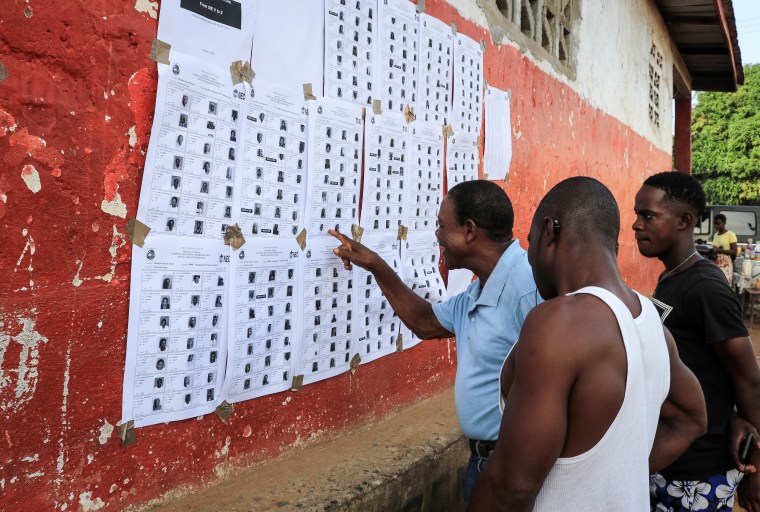In the days leading up to and following senatorial elections in Liberia on December 8, 2020, security forces and civilians attacked, harassed, and threatened members of the press, according to journalists who spoke with CPJ and a statement shared on Facebook by the Press Union of Liberia, a local trade group.
On November 30, in Paynesville, a suburb of the capital, Monrovia, three supporters of Thomas P. Fallah, a senatorial candidate with Liberia’s ruling Coalition for Democratic Change party, forced their way into the office of the privately owned broadcaster Truth FM and attempted to stop an interview that they believed would be overly critical of Fallah, according to Truth FM anchor and consultant Christopher Kolubasiafa Sellee, who spoke to CPJ in a phone interview.
The men chanted slogans in support of the CDC party and tried to force their way into the studio, but were stopped by the station’s security officers, Sellee said. He told CPJ that the men left the scene before the police arrived, and none were arrested.
On December 4, four anonymous people called the privately owned Classic FM broadcaster, based in the city of Kakata, and demanded that the station cease covering CDC events or else they “would regret it,” according to Classic FM General Manager Emmanuel Degleh, who spoke with CPJ by phone.
Degleh said that, following the calls, Classic FM journalists avoided attending some election-related events and the station ensured that staffers did not stay out late, out of fear for their safety.
On December 7, in Liberia’s western Montserrado county, five men chased Obediah Johnson, a reporter with the privately owned Front Page Africa newspaper, after he covered those men allegedly offering people money to vote for CDC candidates, Johnson told CPJ by phone; he said he escaped unharmed.
On December 8, the day of the election, five National Elections Commission officials beat Shammah Dorbor, a program director with the privately owned United Methodist Radio broadcaster, after he covered the same officials hitting and intimidating people who tried to vote without face masks, Dorbor told CPJ by phone.
Dorbor said the officers held his arms and the back of his pants and punched him in the face, stomach, and neck until police broke up the scuffle.
Dorbor told CPJ on January 15 that he went to the hospital following the attack and continued to experience pain in his chest and eyes, for which he was taking medication. He said he reported the attack to the public relations office of the electional commission, but had not heard back.
Also on December 8, six unidentified men chased Edwin Genoway Junior, a senior reporter with Front Page Africa, after he tried to cover those men attempting to force their way into the waiting room of a polling center in Sinkor, a suburb of Monrovia, he told CPJ. Genoway said he escaped unharmed.
On December 13, in Barclayville, a township in Liberia’s southern Grand Kru county, a group of people attacked and stole the phones and voice recorders of Christopher Kumeh, a news director with the privately owned Voice of Grand Kru radio broadcaster, and Emmmanuel Sinyoung Koffa, a program director with the privately owned Ahteenah Radio broadcaster, while they were filming people fighting over election results at a vote collation center in the town, the journalists told CPJ in phone interviews.
The journalists said that a group of about 50 people beat Kumeh all over his body with sticks and their hands for over 10 minutes until police officers intervened. The journalists said that the mob stole both of their phones and voice recorders, but only physically attacked Kumeh.
Security agents at the collation center found and returned Koffa’s phone about three hours later, but he had not found his voice recorder as of January 19, he told CPJ. Kumeh told CPJ on January 19 that his phone and voice recorder had not been returned, and that he suffered severe pains to his neck, head, and feet following the attack.
On January 20, Moses Carter, a spokesperson for the Liberia Police command, told CPJ by phone that he was aware of the attacks on Kumeh and Koffa, and said that police would prosecute those responsible. He said he was not aware of the other attacks on journalists surrounding the election.
CPJ’s calls to Fallah and CDC’s Chairman Mulbah K. Morlu went unanswered.
On January 25, electoral commission spokesperson Henry Flomo told CPJ that he was on vacation and could not comment because he had no knowledge of the threats, harassment, or attacks on journalists during the senatorial elections.
